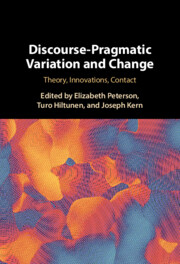Book contents
- Discourse-Pragmatic Variation and Change
- Discourse-Pragmatic Variation and Change
- Copyright page
- Contents
- Figures
- Tables
- Contributors
- Foreword
- Acknowledgments
- Abbreviations
- Introduction
- Part I Innovations in Theory and Method
- Part II Innovative Variables in English
- Part III Language Contact Settings
- 9 You Know in L1 and L2 English
- 10 General Extenders in Bilingual Speech
- 11 The Diverging Paths of Consequence Markers in Canadian French
- 12 What Governs Speakers’ Choices of Borrowed vs. Domestic Variants of Discourse-Pragmatic Variables?
- 13 A Place for pliis in Finnish
- Afterword
- References
- Index
11 - The Diverging Paths of Consequence Markers in Canadian French
from Part III - Language Contact Settings
Published online by Cambridge University Press: 14 July 2022
- Discourse-Pragmatic Variation and Change
- Discourse-Pragmatic Variation and Change
- Copyright page
- Contents
- Figures
- Tables
- Contributors
- Foreword
- Acknowledgments
- Abbreviations
- Introduction
- Part I Innovations in Theory and Method
- Part II Innovative Variables in English
- Part III Language Contact Settings
- 9 You Know in L1 and L2 English
- 10 General Extenders in Bilingual Speech
- 11 The Diverging Paths of Consequence Markers in Canadian French
- 12 What Governs Speakers’ Choices of Borrowed vs. Domestic Variants of Discourse-Pragmatic Variables?
- 13 A Place for pliis in Finnish
- Afterword
- References
- Index
Summary
This study provides a real–time analysis of variation in the use of consequence markers (ça) fait (que), donc, alors and English borrowing so in two genetically related varieties of Canadian French. It is based on corpora collected in the 1970s and 2010s in Montreal, Quebec, a majority francophone environment, and Welland, Ontario, a minority francophone environment. Comparison of the two corpora reveals that Montreal and Welland French had already started to diverge in the 1970s in relation to variant inventory, variant frequency, and constraints on their use and that intercommunity divergence has intensified over time. Among the manifestations of divergence, one can mention the emergence of connector so in Welland in the 1970s and its subsequent growth, at the expense of vernacular variant (ça) fait (que). This stands in contrast with a marked increase of (ça) fait (que) and its diffusion to all social groups in Montreal over time. The evolution of standard variant alors reveals another facet of intercommunity divergence. In Montreal, it has undergone a sharp decline and is becoming obsolescent in the speech of the younger generations; however, in Welland, it evidences stability. Our study discusses some of the (extra)linguistic factors accounting for such patterns of divergence.
- Type
- Chapter
- Information
- Discourse-Pragmatic Variation and ChangeTheory, Innovations, Contact, pp. 230 - 250Publisher: Cambridge University PressPrint publication year: 2022
- 3
- Cited by



